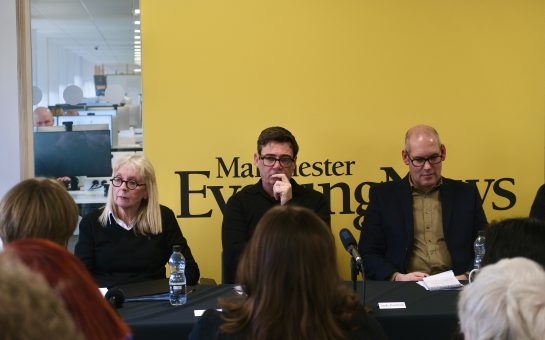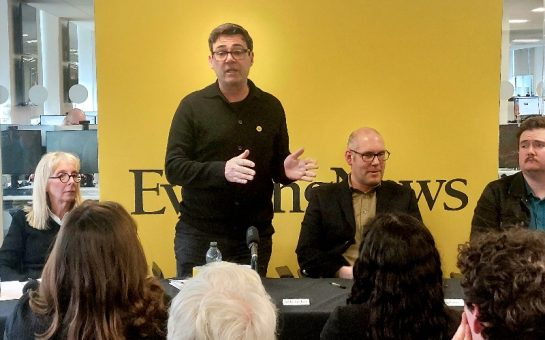Britain’s ‘war on drugs’ has a lot to learn from the legalisation of cannabis in Uruguay and two US states, according to Manchester drug campaigners.
Manchester Re:Vision Drug Policy network are a group of young people seeking effective drug policies based on human rights.
The group have come to life once again in Manchester in a bid to shift the public and political discourse on the war on drugs.
The ever-growing debate around the world about controlling and regulating cannabis and the steps that some counties have recently taken has sparked the re-initiation of the voluntary association.
André Grande, the new coordinator of the network, said: “With the legalisation of cannabis in Uruguay and the two American states, Washington and Colorado, the time has now come to initiate Re:Vision once again.
“The notion of regulating and controlling cannabis, through the process of legalisation, is gaining momentum in the public and political discourse and it is time for our organisation to help shift this attention to the entire War on Drugs.”
Formally headed by Sarah McCulloh, Mr Grande now envisions a new and more powerful network that can produce useful information regarding drugs and drug policies and their effect on the British society.
“We will start producing knowledge, by creating academically styled essays, answering relevant and important questions related to British drug policy and the ‘war on drugs’ issue”, Mr Grande said.
“The goal is to use to the ‘window of opportunity’ which the legalisation of cannabis in Uruguay and the two American states, Colorado and Washington has opened, to push for awareness unto the entire ‘war on drugs’ issue.”
He believes the legalisation of cannabis is not a single issue but it is deeply interconnected with the entire ‘war on drugs’ and Britain can learn lessons from Uruguay, Washington and Colorado.
The organisation will try to interpret data from those regions and put it in the ‘context of the draconian British drug laws’.
The pool of volunteers will also take a closer look at current and upcoming drugs and focus on pressing issue in the Manchester area such as the ‘inefficient and costly approach to the rave culture’s famous use of MDMA’.
“We could focus on the Warehouse Project and how the politicians’ dismissal of anonymous on-site pill and powder testing have resulted in deaths,” he said.
“The strategy for this campaign could be a mix of handing out leaflets, interviewing relatives of the deceased with their consent, writing critical articles about the topic, and finally stage street events where we try to inform the public regarding the dangers of not controlling the substances consumed during raves.”
Mr Grande, currently in the Terrorism and Security Masters Program at Salford University, will coordinate the pool of volunteers and make a plan of action to restart the organisation.
“By forming a grassroots movement based on Re:Vision’s principles of human rights and respect for the individual’s freedom, we can help change the public discourse and make drug legalisation a possibility of the near future,” he explained.
“First and foremost it is important to state that all of the arguments being made for criminalisation are actually arguments for legalisation and regulation. The issue regarding public safety is better managed through tight controlled regulation. The issue of crime is entirely a product of criminalisation; you do not see gangs fighting for control over the liquor market, preciously because it is legal and controlled.”
He says that data from Spain, Portugal and the Netherlands shows a decrease in consumptions levels as a result of decriminalisation and legalisation.
“The ‘war on drugs’ is already being won one step at a time,” he said.
The main issue here is to change the paradigm from a fear based criminalisation as the default approach to a harm reduction human rights strategy.
“Politicians, lawyers, the media and most importantly the public needs to realise that drug taking is never going to stop. Period.”
The government should take responsibility for its ‘failed criminalisation policy’ and start controlling and regulating psychoactive substances, he believes.
Mr Grande explained: “In doing so they could set limits for using these drugs, in the same manner as we don’t allow people to drive without testing their abilities first.
“Furthermore, the government’s role in this paradigm shift will be to inform people instead of arresting them for committing non-violent crimes, thereby giving a lot of people hope back in the fairness of the justice system.
“The important question everyone needs to pose is, do we really want to keep supporting organised crime by handing over the entire drug market to hardcore criminals, or do we want to take responsibility, as a society, and push for legalisation and regulation?”
The head of Re:Vision Drug Policy is calling all interested parties, from students to journalists, to participate in the debate. In the coming months, the initiative is planning to organise an offline campaign to raise awareness on the concrete consequences regarding British drug policy.
Picture courtesy of Prensa 420, with thanks.



